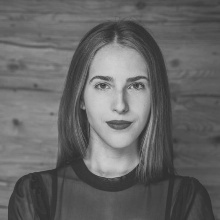Dirk Srocke: You are currently doing your master's degree at the University of Stuttgart and at the same time working as a student trainee at a globally active IT and consulting company. Do you consider yourself an employee or an academic?
Anna-Maria Halacheva: It really depends on the particular week: When I'm taking exams at university, I feel more like an academic; at other times, I spend significantly more time at my employer. There, I see myself as part of a flexible team that works on interesting projects and tries out new technologies.
Srocke: Sounds like a lot of exciting insights into practical applications...
A.-M. Halacheva: Yes, thanks to this experience I have broadened my knowledge and I am no longer afraid to use new tools. Also, I have now seen more informatics fields in practice. Working "hands-on" with customers on real data is super valuable and even more exciting than the formulas, reports and lectures we know from university.
Currently, I am working directly on a project for a large company in the telecommunications industry. There I can follow all the development phases in machine learning. I have participated in Exploratory Data Analysis (EDA) to understand data and identify dependencies. And I've been involved in model training.
Srocke: What experience from your studies were you able to apply?
A.-M. Halacheva: The university definitely taught me how to learn. Without this experience, I might have capitulated to the many new tools, ideas and projects within the first few weeks. Not to forget the basics: My colleagues help me where they can, but of course you should already know some basics, e.g. how Python works.
Srocke: One question comes to mind: How do you reconcile all this in terms of time?
A.-M. Halacheva: Well, I'll be honest: It's really exhausting, because I've written 36 credits this semester and also worked 15 hours a week. That makes eight hours a day, with no weekends and no real evening breaks. You definitely need discipline and you have to be able to plan quite well.
But it's absolutely worth it and I don't regret my decision at all.
Srocke: Speaking of decisions: Have you already decided for yourself whether you want to pursue a career at university or in business?
A.-M. Halacheva: That's a good question. On the one hand, I'm attracted by super-interesting lectures or the work of some lecturers or doctoral students at the university. On the other hand, I really enjoy my work; at university I would definitely miss the contact with customers. So I think a purely university-based career might not be the right decision for me. But I can also imagine maybe doing a doctorate with a company or working in the research department of a company.



